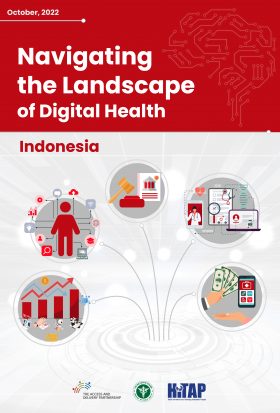This website uses cookies so that we can provide you with the best user experience possible. Cookie information is stored in your browser and performs functions such as recognising you when you return to our website and helping our team to understand which sections of the website you find most interesting and useful.
Navigating the Landscape of Digital Health: Indonesia

Details
Executive Summary
Digital health technology (DHT) offers the potential to expand universal health coverage (UHC) by answering healthcare needs through a wide range of technology applications for instance artificial intelligence, big data, and machine learning. The adoption of DHT is not a new concept although the significance was widely accelerated during the pandemic of COVID-19. Indonesia has been moving towards digital transformation since 2019, as part of the current government’s vision of prospering society through digitalisation in 2025.
Telemedicine has been selected by the government since 2018 to address the traditional challenges in healthcare as in the Presidential Regulation of the Republic of Indonesia No.82/2018 Regarding Health Insurance. Both private and government-based telemedicine has been growing ever since in the country.
The Ministry of Health Indonesia (MoHI), through the Decree No. 46/2017, defines e-health as the utilisation of information and communication technology to improve health quality service, efficiency, and effectiveness. These include health management information systems, electronic medical records, surveillance systems, health knowledge management, telemedicine, mobile health, consumer health informatics, e-learning in health sciences, and medical research. Yet, if DHT is considered a medical device, the definition and registration will be referring to the Decree of 62/2017 such as medical devices, in-vitro diagnostics, and household health supplies.
The guideline for digital transformation has been laid out in the Blueprint of Digital Transformation Strategy 2024 launched by the MoHI. The main strategy in this blueprint is not to create another application but rather restructure the system through health data integration, develop a comprehensive citizen information system, and a new design of health business architecture. Data architecture is supported by Fast Healthcare Interoperability Resources (FHIR) and OpenEHR systems and protected by a consent base.
The Digital Transformation Office (DTO) of MoHI coordinates the overall governance system and is supported by other working groups including Badan Penyelenggara Jaminan Sosial (BPJS). Each unit has a different function in every phase of technology development. Only in the planning, product/service research, piloting, and implementation phases are all units working together. The structure currently does not include the Ministry of Communications and Information Technology (MCIT).
As the government begins to boost health technology services in Indonesia, the market has become more established and is increasing the demand. The Indonesian digital economy, revenue, and internet penetration are promising for DHT adoption in the country. In addition, the digital literacy curriculum and programmes established by the MCIT can narrow the digital literacy gap between the population and the workforce.
The rapid utilisation of DHT also has implications for inclusion in the national insurance program (JKN). There has not been a reimbursement mechanism for DHT but there have been trials for telemedicine, which is based on capitation. Critics have identified issues in relation to the adoption and feasibility of telemedicine to users (patients and health workers) and its equity. An opportunity for the realisation is seen yet requires multi-sector consultations based on the Indonesian landscape’s strengths, weaknesses, opportunities, and threat analysis. The analysis of Indonesia’s digital health ecosystem in this report presents valuable lessons for other countries.




